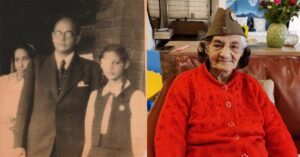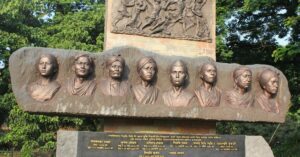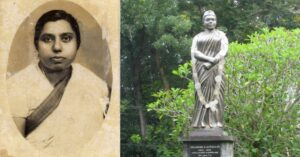Faced Tragedy & Imprisonment, Yet This Brit Lady Didn’t Stop Fighting for India’s Freedom!
She wasn’t born an Indian national, and yet the passion that Nellie Sengupta had for the Freedom Struggle was one that deserved to be written about in history books.

In colonial India, Nellie Sengupta was a British woman fighting for the unification of Indians against the British Raj
She recalls the first night she was imprisoned in the Delhi Jail in 1931.

Why?
Because she led a mass assembly and expressed her outrage over her freedom fighter husband’s arrest. She also witnessed the inherent divide that existed among undertrial prisoners.
“At first, one could not sleep. Powerful lights were on all night. Shouts of Hindu Pani, Muslim Pani, and the shouts of guards drowned everything. Gradually, one got used to all this noise and slept through everything,” Late Nellie Sengupta had recalled in an interview with The Socialist India in 1973.
She wasn’t born an Indian national, and yet the passion that Nellie Sengupta had for the Freedom Struggle was one that deserved to be written about in history books.
As we celebrate her death anniversary today, here’s a small attempt to document the life and times of this gritty and courageous woman who won the hearts of Indians by taking risks, flouting rules to anger the British Raj and stepping forward to be imprisoned for India.
She was named Edith Ellen Gray at birth, by her parents Frederick William and Edith Henrietta Gray who lived in Cambridge, England.
But her journey towards India was sparked by love. One that bloomed in her as a young college student for a Bengali law student, Jatindra Mohan Sengupta. The son of Indian lawyer and member of the Bengal Legislative Council, Jatra Mohan Sen, he hailed from erstwhile Chittagong.
They came from different backgrounds. But Nellie was a spirited young woman who was determined to make it work.
When her parents refused to give their blessings to the couple, Nellie married Jatindra against their wishes in 1909. Such was her level-headedness that she decided to leave her own country and settle down with Jatindra’s joint family in India, where they moved on to bear two sons–Sishir and Anil.
Having studied law abroad, Jatindra became a successful lawyer. He served as a delegate to the Bengal Provisional Conference at Faridpur in 1911.
Life for the couple changed when the freedom struggle kicked in with the Non-Cooperation Movement in 1921. The passion shown by the freedom fighters led by Gandhi compelled Jatindra to quit his lucrative job as a lawyer become a freedom fighter.
Nellie, as a true partner not only supported him, but decided to become an active part of the struggle.
Jatindra was a close henchman to Bapu. When he was jailed by the British government for participating in the Assam-Bengal Railway men’s strike as the president of the labour union of the railways and Burmah oil company, Nellie waged her own struggle against the Raj.
She expressed her outrage against her husband’s arrest and organised mass meetings. This drew the ire of the district authorities who had banned such assemblies.
She was imprisoned in the Delhi Jail for flouting rules for four months in 1931. She refers to the prison as being ‘dirty’ and ‘slackly run’.
“There was no privacy. I was not well one day and the doctor was called. I woke up early one morning to find the doctor and the head jailor standing in my bedroom looking at me. I felt most embarrassed,” she recalls in the same interview with The Socialist.
Jatindra was jailed in Ranchi and died two years later in 1933.
And while it would be convenient for most of us to think that Jatindra’s death would end Nellie’s participation in the freedom struggle, it didn’t.
As men from her own country tried every trick in the book to sabotage the freedom movement, Nellie went door to door selling home-made Khadi (hand-spun cloth) in Chittagong. To help people boycott British products and revive domestic ones as part of the Swadeshi Movement.
During the Salt Satyagraha, when a number of leaders were put behind bars by the British, including the President-elect of the Indian National Congress, Pandit Madan Mohan Malviya, there was a void. Who would head the INC’s Kolkata session?
It was at this time that Nellie Sengupta shouldered the responsibility. She was elected the president of the INC at the 47th annual session in Kolkata in 1933. This made her the third woman, and the second European-born woman to be elected for this position. She moved on to becoming the Alderman to the Calcutta Corporation in 1933 and 1936 and also served as a member of the Bengal Legislative Assembly in 1940 and 1946.
Read more: At 21, This Feisty Bengali Woman Etched Her Mark on India’s Freedom Struggle!
During the partition of 1947, Nellie chose to stay back in her husband’s paternal home in his hometown of Chittagong (then East Pakistan), in Bangladesh.
And as an active social worker and a member of the Minority Board, she continued to work for the cause of the oppressed Hindu minorities.
She broke her hip in 1972 and travelled to Calcutta from Bangladesh with the assistance of the Indian Govt under then Prime Minister Indira Gandhi, where she received a special welcome into the country. She was awarded the Padma Vibhushan by the Government of India in 1973, and breathed her last the same year on October 23.
Nellie’s story reminds us of the hundreds of women who fought for the nation but were never given their due.
(Edited by Shruti Singhal)
Like this story? Or have something to share?
Write to us: [email protected]
Connect with us on Facebook and Twitter.
This story made me
-
97
-
121
-
89
-
167
Tell Us More
We bring stories straight from the heart of India, to inspire millions and create a wave of impact. Our positive movement is growing bigger everyday, and we would love for you to join it.
Please contribute whatever you can, every little penny helps our team in bringing you more stories that support dreams and spread hope.



















